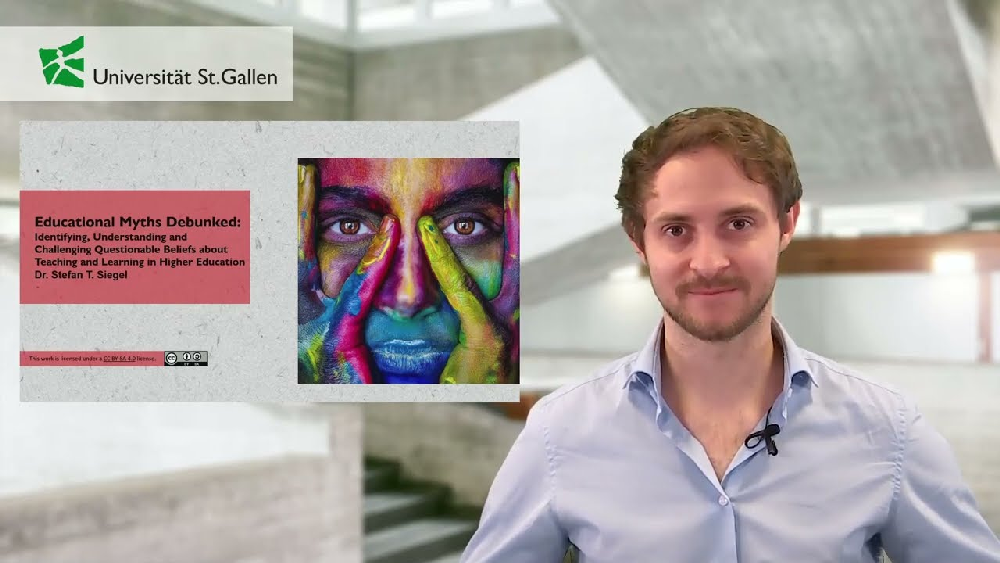Identifying, Understanding and Challenging Questionable Beliefs about Teaching and Learning in Higher Education
| Speaker | Date | Time | Format | Subject |
| Dr. Stefan T. Siegel | Tuesday, 24 October 2023 | 09.00-13.00 | face-to-face | Design Evidence-based Teaching & Learning Processes |
Course Description
You’re a visual learner. We only use 10% of our brains. Best teaching is value neutral. There are multiple intelligences. Educational myths often appear in the form of phrases and platitudes. Although many of these questionable beliefs about educational phenomena lack empirical evidence, they are sometimes widespread, persist, and have somehow managed to become everyday knowledge (De Bruyckere et al., 2020; Sinatra & Jacobson, 2019). Although these myths sometimes blossom from a seed of a fact, they can be problematic, especially when policymakers, educators, or researchers unconsciously act on them, or even spread them.
Accordingly, in this course we focus on identifying, understanding and challenging prevailing myths in higher education to foster our individual professionalization and to become a critically reflective teacher / reflective practitioner. As Pennycoock et al. 2015 would say: “One benefit of gaining a better understanding of how we reject other’s bullshit is that it may teach us to be more cognizant of our own bullshit” (Pennycook et al., 2015, p. 26).
Learning Objectives
The participants …
- reflect their own experiences with educational myths
- understand why these questionable beliefs can be problematic for various stakeholders including themselves
- know about prevailing educational myths in teaching and learning and can use a heuristic to identify and analyze questionable beliefs
- learn about and develop strategies to deal with these seemingly never dying zombie concepts in a professional and evidence-based manner
Course Content
- Overview of prevailing myths in higher education
- Empirical evidence about the prevalence of these myths, their causes, their consequences and possibilities of prevention
- How to recognize educational myths: Heuristics for identifying and understanding questionable beliefs about teaching and learning in higher education
- Dealing with persisting myths in education
Methodology
A central element of the course is the collegial exchange about experiences with educational myths in higher education. Methods used:
- Small Preparatory Assignment (Flipped Classroom)
- Interactive impulse lectures
- Practical exercises
- Discussion and exchange of experiences
Additional Information
De Bruyckere, P., Kirschner, P. & & Hulshof, C. (2020). More Urban Myths About Learning and Education. Challenging Eduquacks, Extraordinary Claims, and Alternative Facts. Routledge.
Pennycook, G., Cheyne, J. A., Barr, N., Koehler, D. J., & Fugelsang, J. A. (2015). On the reception and detection of pseudo-profound bullshit. Judgment and Decision Making, 10, 549–563.
Siegel, S. T., & Daumiller, M. (Hrsg.). (2020). Wissenschaft und Wahrheit: Ursachen, Folgen und Prävention wissenschaftlichen Fehlverhaltens. Budrich.
Target Groups
This course was specifically designed for instructors teaching in higher education as well as for administrators in charge of course/program planning.
Instructor

Dr. Stefan T. Siegel
Dr. Stefan T. Siegel
is a postdoc researcher at the Institute of Business Education and Educational Management at the University of St.Gallen with research interests in educational theory, professionalization of university instructors, science theory and communication as well as sustainability education.
Course fees
For employees of the University of St.Gallen, the course fee is covered by the University. External participants will be charged CHF 180.- for a half-day course and CHF 300.- for a full-day course.
Course location
The face-to-face courses take place on the campus of the University of St.Gallen. The exact course location will be announced after registration about one week before the course starts.
Contact
If you have any questions, please contact the Centre of Learning and Teaching in Higher Education (HDZ-HSG) at Dufourstrasse 40a, 9000 St.Gallen via hdzhsg@unisg.ch or call +41 71 224 2630.
